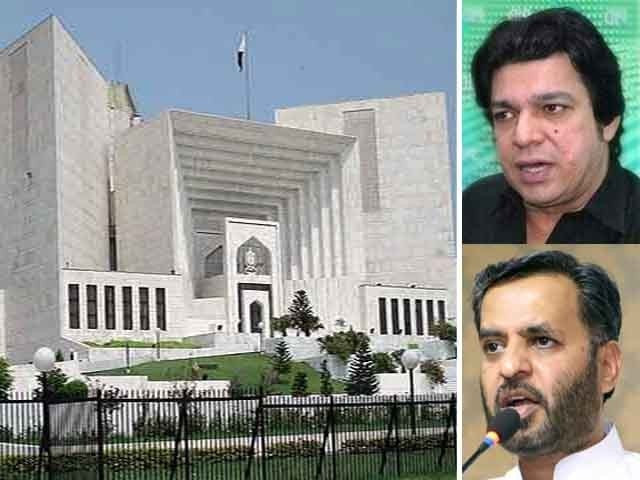SC calls for upholding respect of institutions
Three-judge bench issues show-cause notices to Vawda, Kamal over contempt

The Supreme Court issued show-cause notices on Friday to Senator Faisal Vawda and Muttahida Qaumi Movement-Pakistan’s (MQM-P) National Assembly Member (MNA) Mustafa Kamal for their remarks about the judiciary during a contempt of court case hearing.
A three-member bench, led by Chief Justice Qazi Faez Isa and including Justice Naeem Akhtar Afghan and Justice Irfan Saadat Khan, summoned the two lawmakers to appear in person at the next hearing on June 5.
The bench also directed the Pakistan Electronic Media Regulatory Authority (Pemra) to submit video recordings and Urdu transcripts of Faisal Vawda’s press conference from May 15 and Mustafa Kamal’s press conference from May 16.
The apex court took suo motu notice of the lawmakers’ separate press conferences. Chief Justice Isa observed that both Vawda and Kamal, as members of parliament, had the opportunity to speak on the floor of their respective houses but chose to make their remarks at press clubs instead.
At the outset of the hearing, Chief Justice Isa asked Additional Attorney General (AAG) Aamir Rehman if he had heard Vawda’s press conference and whether the contents were contemptuous. The AAG replied that the words were muted in the footage he had seen.
The chief justice underscored the importance of respecting institutions, stating that while there are both good and bad journalists, blaming journalism as a whole is unwarranted. He emphasized the need for accountability, saying, "If I have erred, point it out, but refrain from tainting the entire judiciary."
Acknowledging the judiciary's imperfections, Chief Justice Isa noted its ranking at 137 globally. He highlighted efforts to enhance transparency, including reducing his own powers after the Practice and Procedure Act. This, he stated, has brought clarity to bench formations.
Chief Justice Isa remarked that many things were said about him but he always showed patience. However, he emphasised that “I am the Chief Justice of Pakistan as well as the head of an institution” and he could not allow the culture of abuses. “There is limit to tolerance.”
Read IHC responds to Vawda on Justice Babar Sattar’s citizenship
The court remarked that the “weakest individuals” were those who resorted to carrying guns and hurling abuses. He went on to say that if anyone had solid argument, he could “silence us with his arguments”, and asked what could be achieved by shouting and threatening.
To elaborate further on his stance regarding the futility of personal attacks, the chief justice referred to a specific incident: “A commissioner claimed I rigged elections. How can a chief justice rig elections?” He added “why the needless clamour and theatrics” when the court was open to constructive criticism.
He said that if anyone had any suggestions for improvement in the judiciary he could write to the registrar, but this was not done because it would not bring fame. While referring to Vawda and Kamal, he added that they took advantage of his patience and thought that they should also make a speech.
He emphasised that the one wielding gun was the weakest because he had nothing to say and after that the weaker person was the one who hurled abuses. He noted that these sorts of remarks were rare in civilised societies; therefore, contempt of court notices were not issued there.
The chief justice stressed that he would not allow anyone to target the institution by name. “Institutions belong to the people, defaming institutions is no service to the country,” he said, stressing the need for reading the Constitution and the laws related to freedom of expression and the contempt of court.
The chief justice underscored the importance of acknowledging mistakes. “Mistakes were made, they should be accepted, and we should move forward,” he said. “Criticism should be made for improvement,” he added.
Citing the example of the court’s opinion on presidential reference on death penalty awarded to former prime minister Zulfikar Ali Bhutto more than 40 years ago, the chief justice said that the court could not bring Bhutto back to life, but it could only accept its mistake.
He categorically stated that he would never defend those who validated martial laws. Later, the court issued notices to both the lawmakers and summoned the record of their press conferences. The hearing was adjourned until June 5.



















COMMENTS
Comments are moderated and generally will be posted if they are on-topic and not abusive.
For more information, please see our Comments FAQ